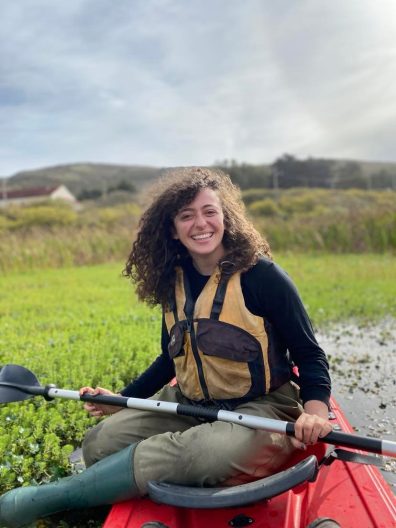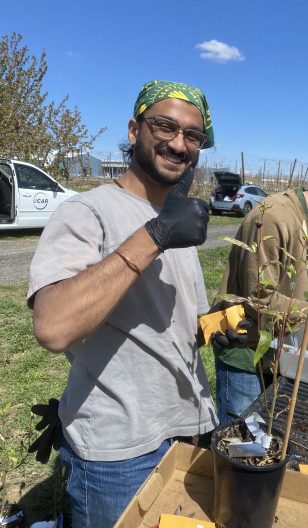SEFS graduate students and staff were recently awarded fellowships through the National Science Foundation Graduate Research Fellowships Program (NSF GRFP). Awardees Turtle May, a graduate student in SEFS Research Associate Professor Ernesto Alvarado’s lab, and Lara Volski, a graduate student in SEFS Assistant Professor Alex McInturff’s lab participated in a UW NSF GRFP application workshop last fall. Incoming graduate student Masha Vernik also received a fellowship and will be studying with SEFS Assistant Professor Sameer Shah. Sriram Parasurama, a research aid in SEF Professor Soo-Hyung Kim’s lab, was awarded as well. Learn more about their research plans below. Congratulations on this achievement!
Turtle May
As part of the Pacific Wildland Fire Sciences Laboratory, my project is centered around assisting tribal forest managers in evaluating the impact of their forest management practices on wildfire behavior and severity, while also contributing to the understanding of how dry forests adapt to wildfire and climate change in the western United States. My project works in partnership with the Confederated Tribes of the Colville Reservation to evaluate the effectiveness of fuel treatments at mitigating wildfire severity on the Reservation using LiDAR, field data, and fire modeling. In burned portions of the Reservation’s forested landscape, I am evaluating fuel treatment effectiveness as represented by mortality and damage. In unburned portions of the Reservation’s forested landscape, I will use field data to model potential wildfire behavior and severity in treated and untreated areas. These components together will form a cohesive body of knowledge to support tribal forest managers in their efforts to cultivate fire-resilient forests, preserving their land for generations to come.
The NSF Graduate Research Fellowship Program Workshop (GRFP) was an incredibly valuable experience that I highly recommend to any student applying for the NSF GRFP. With multiple experienced mentors supporting me, answering all my questions, and providing individualized feedback, along with peer feedback and support with essay writing, this workshop made the NSF application feel less daunting and more accessible. I am certain that I would not have been able to earn this fellowship without this workshop.

Lara Volski
Two wolves have dispersed to Klickitat County, WA for the first time in 80 years. Their return offers an opportunity to examine what informs the willingness of humans to tolerate wolves at this early, critical, and polarizing stage of dispersal. Throughout my dissertation, I will seek to understand how wolf occupancy and human tolerance reciprocally influence each other. The GRFP workshop led by Markus Min and Helena McMonagle was immensely helpful for putting together my application – it provided a community of support as well as access to mentors who helped me brainstorm ideas and wordsmith my essays!
Masha Vernik
I am an incoming MS student at the School of Environmental and Forest Sciences. I aim to work towards an equitable and resilient food system and will investigate agricultural resilience to climate change from a socio-ecological perspective. I plan to study with Professor Sameer Shah.

Sriram Parasurama
My proposal was to study the effects of root-associated beneficial microbes on whole-plant physiology, and build an agent-based model based on these findings. The strength of an agent-based model would be that it could predict emergent properties that we otherwise couldn’t experimentally observe. Additionally, current whole-plant models don’t incorporate plant-microbe interactions, especially in roots, making this proposal all the more valuable.
The open and collaborative nature of SEFS is what made this proposal successful. Since I am not trained in microbiology or experienced in modeling, I was able to work with members in the Kim Lab and other labs to consult with their expertise and write the best proposal possible. Additionally, I am very lucky to have so much independent research experience just one year out of a bachelor’s degree, all thanks to SEFS and Biology. Dr. Kim is especially encouraging of undergraduate participation in the lab and values the thoughts and ideas of someone like myself just as much as a senior research scientist.
The SAFS/SEFS workshop was another space that helped refine my proposal. The mentors were fantastic and I appreciate them taking the time out of a busy graduate student schedule to help us with this.
I plan to take this training and experience to Cornell, where I’ll pursue a Master’s and PhD. I hope to work at the intersection of plant science, modeling, indigenous ways of knowing, and food and land sovereignty.